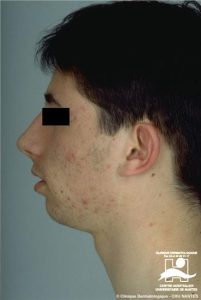SERVICES
- Allergy Screening
- Chemical Peels
- Dermapen
- Facial Skin Analysis
- FreshEyes
- Hyperhidrosis (Excessive Sweating)
- Hair Loss Treatment
- Laser Clinic
- Liquid Facelift
- Keloid Treatments
- Medical Facials
- Medical Treatments
- Mole Mapping
- Photodynamic Therapy (PDT)
- Skincare Advice
- Pigmentation Treatment
- Surgical Procedures
- Ultraviolet Phototherapy
USEFUL LINKS
What is acne?
 Acne is a very common skin condition characterised by comedones (blackheads and whiteheads) and pus-filled spots (pustules). It usually starts at puberty and varies in severity from a few spots on the face, neck, back and chest, which most adolescents will have at some time, to a more significant problem that may cause scarring and impact on self-confidence. For the majority it tends to resolve by the late teens or early twenties, but it can persist for longer in some people.
Acne is a very common skin condition characterised by comedones (blackheads and whiteheads) and pus-filled spots (pustules). It usually starts at puberty and varies in severity from a few spots on the face, neck, back and chest, which most adolescents will have at some time, to a more significant problem that may cause scarring and impact on self-confidence. For the majority it tends to resolve by the late teens or early twenties, but it can persist for longer in some people.
Acne can develop for the first time in people in their late twenties or even the thirties. It occasionally occurs in young children as blackheads and/or pustules on the cheeks or nose.
What causes acne?
The sebaceous (oil-producing) glands of people who get acne are particularly sensitive to normal blood levels of a hormone called testosterone, which is present in both men and women. This causes the glands to produce an excess of oil. At the same time, the dead skin cells lining the pores are not shed properly and clog up the follicles. These two effects result in a build up of oil, producing blackheads (where a darkened plug of oil is visible) and whiteheads.
The acne bacterium (known as Propionibacterium acnes) lives on everyone’s skin, usually causing no problems, but in those prone to acne, the build-up of oil creates an ideal environment in which these bacteria can multiply. This triggers inflammation and the formation of red or pus-filled spots.
Is acne hereditary?
Acne can run in families, but most cases are sporadic and occur for unknown reasons.
What does acne look like and what does it feel like?
The typical appearance of acne is a mixture of the following: oily skin, blackheads and whiteheads, red spots, yellow pus-filled pimples, and scars. Occasionally, large tender spots or cysts may develop that can eventually burst and discharge their contents or may heal up without bursting. The affected skin may feel hot, painful and be tender to touch. Not all spots are acne, so if there is something unusual about the rash it may be advisable to consult your doctor.
How is acne diagnosed?
Acne is easily recognised by the appearance of the spots and by their distribution on the face, neck, chest or back. However, there are several varieties of acne and your doctor will be able to tell you which type you have after examining your skin. The most common type is ‘acne vulgaris’.
Can acne be cured?
At present there is no ‘cure’ for acne, although the available treatments can be very effective in preventing the formation of new spots and scarring.
How can acne be treated?
If you have acne but have had no success with over-the-counter products then it is probably time for you to visit your doctor. In general, most treatments take two to four months to produce their maximum effect.
Acne treatments fall into the following categories:
- Those that are applied directly to the skin (topical treatments)
- Oral antibiotics (tablets taken by mouth)
- Oral contraceptive pills
- Isotretinoin capsules
- Other treatments
Topical treatments
These are usually the first choice for those with mild to moderate acne. They should be applied to the entire affected area of the skin (for example all of the face) and not just to individual spots, usually every night or twice daily. Consult your doctor if they cause irritation of the skin; reducing the frequency of application may be required, at least temporarily, to help overcome this problem. There are a variety of active anti-acne agents, such as benzoyl peroxide, antibiotics (erythromycin, tetracycline and clindamycin), retinoids (such as tretinoin, isotretinoin and adapalene), azelaic acid and nicotinamide.
Oral antibiotic treatment
Your doctor may recommend a course of antibiotic tablets, usually erythromycin or a type of tetracycline, which should be taken in combination with suitable topical treatment. Antibiotics need to be taken for a minimum of two months, and are usually continued until there is no further improvement, for at least 6 months. Some should not be taken at the same time as food, so read the instructions carefully.
Oral contraceptive treatments
Some types of oral contraceptive pills help females who have acne. The most effective contain a hormone blocker (for example, cyproterone) which reduces the amount of oil the skin produces. It usually takes at least three to four months for the benefits to show. Although they may not be taken for this reason, the pills also help to prevent conception. As they prevent ovulation, they may be less suitable in young teenage girls where ovulation is not well established.
Isotretinoin
This powerful and effective treatment has the potential to cause a number of serious side effects and can be prescribed only by a dermatologist. Isotretinoin can harm an unborn child. Women will be asked to enrol in a pregnancy prevention programme and need to have a negative pregnancy test prior to starting treatment. Pregnancy tests will be repeated every month during treatment and five weeks after completing the course of treatment. Effective contraception must be used whilst on treatment, and for four weeks afterwards.
There are concerns that isotretinoin may cause depression and suicidal feelings. Details about any personal and family history of mental illness should be discussed with your own doctor and dermatologist prior to considering treatment with isotretinoin. Most courses of isotretinoin last for four months during which time the skin may become red and dry. Often, acne becomes a little worse before improvement occurs. It should be emphasised that many thousands of people have benefited from treatment with isotretinoin without serious side effects.
Other treatments
There have been developments in the use of light and laser therapy for inflammatory acne but these forms of treatment have yet to be fully evaluated and are generally ineffective in the treatment of severe inflammatory acne. Laser resurfacing of facial skin to reduce post-acne scarring is an established technique requiring the skills of an experienced laser surgeon.
What can I do?
- Try not to pick or squeeze your spots as this usually aggravates them and may cause scarring.
- However your acne affects you, it is important to take action to control it as soon as it appears. This helps to avoid permanent scarring and reduces embarrassment. If your acne is mild it is worth trying over-the-counter preparations in the first instance. Your pharmacist will advise you.
- Expect to use your treatments for at least two months before you see much improvement. Make sure that you understand how to use them correctly so you get the maximum benefit.
- Some topical treatments may dry or irritate the skin when you start using them. An oil-free moisturiser should help, but you may also have to cut down on the frequency with which you apply the treatments, for example to using them on alternate nights.
- If you wear make-up, wear products that are oil-free or water-based. Choose products that are labelled as being ‘non-comedogenic’ (should not cause blackheads or whiteheads) or non-acnegenic (should not cause acne).
- Cleanse your skin and remove make-up with a mild soap or a gentle cleanser and water, or an oil-free soap substitute. Scrubbing too hard can irritate the skin and make your acne worse.
- There is little evidence that any foods cause acne, such as chocolate and “fast foods”, however, your health will benefit overall from a balanced diet including fresh fruit and vegetables
Patient Testimonials
EXCELLENTTrustindex verifies that the original source of the review is Google. From my first visit with Dr Jhetam I knew I would go back. He is compassionate , friendly and has an interaction which made you feel comfortable. This is very important in any doctor because our relationship with our doctor is very intimate.Trustindex verifies that the original source of the review is Google. Dr Jhetman is truly one of a kind. Anyone who is fortunate enough to be in his care can so grateful. Academic, informative and reassuring. It’s hard to find a doctor who has this combination of skills these days. He dealt with my Melonoma concerns with swift and professional care. And his staff are equally as competent and caring. I cannot commend Dr Jhetman and his staff enough on true patient care. Thank you!Trustindex verifies that the original source of the review is Google. I was absolutely satisfied with my experience with Dr Jhetham & his winning team. Keep up the good work.Trustindex verifies that the original source of the review is Google. Best skin doctor..Dr Jetham prescribed the best products that have brought so much of a glow to my skin..being a transplant patient and so much happening to my skin just 4 visits to him and my face is back to it's radiance ..I hightly reccomend Dr Jetham ...you won't go wrong..Trustindex verifies that the original source of the review is Google. Dr. Imraan Jhetam and his team provided exceptional care, showcasing professionalism and compassion in every interaction. Dr. Jhetam took the time to thoroughly explain everything, addressing each of my concerns with empathy and understanding. My experience with him was truly wonderful, and I highly appreciate his dedication to patient care.Verified by TrustindexTrustindex verified badge is the Universal Symbol of Trust. Only the greatest companies can get the verified badge who has a review score above 4.5, based on customer reviews over the past 12 months. Read more



